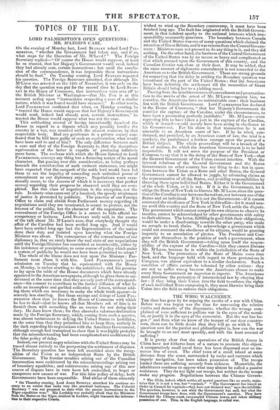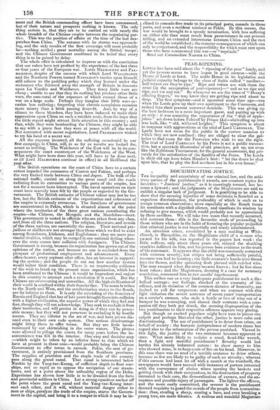THE WHIG WALCHEREN.
THE time has gone by for arguing the merits of a war with China. Before war was begun was the time for canvassing the relative merits and demerits of the disputants; whether the wrongs com- plained of were sufficient to palliate war in the eyes of the moral- ist, or justify it in the eyes pf the economist. But the war has be- gun ;* and from what we know of the temper of our dear country- men, there can be little doubt that they will go on with it. The question now for the patriot and philanthropist is, how can the war be brought to an end most speedily, and with the least amount of suffering ?
It is pretty clear that the operations of the British forces in China have not hitherto been of a nature to promote this object. A comparatively small naval force has been dispersed over an im- mense line of coast. The chief town of a small island at some distance from the coast, surrounded by rocks and currents which impede navigation, has been taken possession of. The troops landed there are suffering severely from sickness. Meanwhile, the inhabitants continue to oppose what may almost be called a passive resistance. They do not fight our troops, but neither do the troops make any progress. Negotiations between the, Chinese Govern- , • The Globe, indeed, which settles all mortal questions like an oracle, main- tains that it is not a war, but "reprisals." " The Government has issued an Order in Council for reprisals—they have not declared war," says the infallible. The question, however, is not what the Government has said, but what the Government troops have done, with the Government's sanction. They have blockaded the Chinese coast, cannonaded Chinese towns, and taken military possession of one. This, in the English language, is called war.
went and the British commanding officer have been commenced, but of their nature and prospects nothing is known. The only thing certain is, that they are to be carried on with nearly the whole breadth of the Chinese empire between the negotiating par- ties. This was the position of affairs at the time of the last des- patches from China. The autumn with its storms was approach- ing, and the only results of the first campaign will most probably be—nothing settled ; great mortality among the British troops ; and the Chinese Government confirmed in its belief that every thing is to be gained by delay.
The whole affair is calculated to impress us with the conviction that our rulers have not profited by the experience of the last three or four years of the European war. Lords MELBOURNE and PAL- MERSTON, despite of the success with which Lord WELLINGTON and the Northern Powers turned NAPOLEON'S tactics upon himself, still adhere to the peddling policy which they learned under the statesmen who frittered away the strength of Britain in descents upon La Vendee and Walcheren. They fancy little wars are cheap ; unable to see that they do nothing but produce other little wars, the sum-total of the expenses of which exceed those of a war on a large scale. Perhaps they imagine that little wars oc- casion less suffering; forgetting that chronic complaints occasion more misery than a brisk passing fever-fit. And, by way of a climax to these blunders, they have been induced to make their aggressions upon China on such a ininikin scale, from the hope that the little report might attract little attention in this country ; and that, while they were bombarding the Chinese, they might be able to say with a grave face they were at peace with all the world. Not contented with secret negotiations, Lord PALMERSTON wished to try his hand at a secret war. All the expense incurred, all the suffering occasioned by our first campaign in China, will, in so far as results are looked for, count as nothing. The Walcheren of the East will be in its con- sequences the exact counterpart of the Walcheren of the West. What might have been done this year, will have to be done next, or (if Lord MELBOURNE continue in office) in all likelihood the year after. 'The British operations on the coast of China have to a certain extent impeded the commerce of Canton and Fokien, and perhaps the very limited trade between China and Japan. The bulk of the national traffic, carried on along the great canal and the roads radiating from its extremities to various parts of the empire, has not for a moment been interrupted. The naval operations on their coast have scarcely been felt by the people or regarded by the Go- vernment. The British estimate of Chinese valour may not be too low, but the British estimate of the organization and coherence of the empire is extremely erroneous. The functions of government are concentrated in Pekin, which is situated almost at the point where the territories of the three great nations constituting the empire—the Chinese, the Mongols, and the Mandchus—meet. The government is vested in officials who are taken from any class, andfnam all the three nations. The religion, literature, and morals of the three nations, are essentially the same. Their national pre- judices or dislikes are not stronger than those which we find to exist among Scotchmen, Irishmen, and Englishmen : they are mere pro- vincial rivalries, which maybe merged in one national feeling when- ever the state comes into collision with foreigners. The Chinese Government is strong, because its organization has grown out of the opinions of the nation, and because no one is excluded from the prospect of professional employment and advancement. Every office-bearer, every aspirant after office, has an interest in support- ing the system ; and the people do not see how another system would better their condition. There is no trustworthy evidence of the wish to break up the present state organization, which has been attributed to the Chinese : it would be imprudent and unjust in this country to attempt such a revolution if it could. But the Chinese are overweening and unwarlike. All the high civilization of their world is confined within their frontier line. 'F he nomale tribes to the North and West, and the semibarbarian states to the South, are far inferior to them. It is only the extending of the frontiers of Russia and England that has of late years brought them into collision with a higher civilization, the superior power of which they feel and fear, though they will not acknowledge. They seek to exclude it from their territories, and will persist in doing so if 'they can by peace- able means ; but they will not persevere in excluding it by hostile means. They are inferior in the art of war, and have grown dis- used even to their own rude system. One serious disadvantage might bring them to offer terms. But they are little incon- venienced by our skirmishing in the outer waters. The pirates were allowed to pillage the coasts for many years before the in- convenience was felt in the interior. One easy and decisive step —which might be taken by an inferior force to that which we have at present in those seas—would probably bring the Chinese Government to offer terms in earnest. Pekin, the seat of go- vernment, is entirely provisioned from the Southern provinces. The supplies of provision and the staple trade of the country pass along the grand canal. That canal is intersected below Nankin by the Yang-tze-Keang, of sufficient depth to float war- ships, not so rapid as to oppose the navigation of our steam- boats, and at a point above the unhealthy region of the Delta. Experience has shown how little is to be dreaded from the forts and provincial soldiers in China. Let a strong squadron anchor off the point where the great canal and the Yang.tze-Keang inter- sect each other, and it will, without material danger either to men or ships, paralyze the trade of the empire, starve the Govern- ment in the capital, and bring it to a temper in which it may be in-
dined to concede free trade to its principal ports, consuls in those ports, and even a resident minister at Pekin. By this means, the war would be brought to a speedy termination, with less suffering on either side than must result from perseverance in our present trifling, and an extended intercourse between China and the rest of the world be established; the remoter consequences of which can only be conjectured, and the responsibility for which must rest upon those who have commenced this war—or "reprisals."
Send out Commodore NAPIER to China.



























 Previous page
Previous page